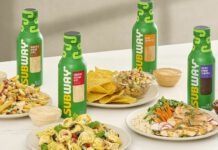Consumers expect both more and less from foodservice. “What I’m expecting everywhere I go now in this world is this concept of more and less,” explains business strategist Tony Chapman. “I want more functional food, more plant based, more progress, more convenience. I want more and more and more, but I want it with less friction, less effort, less waste.”
It’s this more-and-less attitude that’s facilitating the rising popularity of plant-based beverages. As they contend with busy lifestyles, consumers are seeking convenient ways to foster healthy lifestyles and ensure proper nutrition — making beverages an ideal solution. The popularity of non-alcoholic drinks also drives interest in plant-based beverages, as consumers still seek a flavourful experience during their social outings.
“We find, repeatedly, across the research we do in retail foodservice, that a really strong beverage program can drive loyalty and value proposition,” says Donna Hood Crecca, principal, Technomic Inc.
“Canadians are likely to be careful about what they eat — that’s not going to change and it’s just going to continue to evolve,” Asad Amin, VP, Canada, Marketing Strategy & Understanding at Ipsos, stated during the RC Leadership Conference 2020 held recently in Toronto. He notes consumers aim to strike a balance between indulgence and not feeling guilty when frequenting foodservice — a concept he dubs “permissible pleasures” — with key drivers being ethical choices, health and wellness and seeking more pure, fresh ingredients. Amin also points to successful newcomers to in industry built around the concept of permissible pleasures. Among these are Toronto-based businesses nutbar and Greenhouse.
“Our mission is to offer widespread sustainable access to plant-based nutrition and wellness of the highest quality,” explains Hana James, co-founder and director of Community, Greenhouse. The company, which was founded in 2014, operates 13 locations in Toronto, in addition to a robust retail and wholesale program. Greenhouse offers six organic, plant-based product lines, including cold-pressed juices, kombuchas, nutmilks, probiotic hydrators, shakes and booster shots.
And, with the company’s mission tying neatly into a number of growing food-and-beverage trends, she feels this focus has helped drive the brand’s growth. “We’ve gone from one shop in Toronto, where basically a small team of us pressed by night and sold juice by day, to a national organic, plant-based-beverage brand,” she explains. “People want to see [plant-based beverages] in their grocery stores…they want to see these options at their local coffee shop or when they go out for dinner. They don’t want to have to go to a plant-based or vegan restaurant; they want to have those options without giving up anything else, which has really driven our growth in other channels.”
Founded by holistic nutritionist Kate Taylor Martin, nutbar is a healthy-café concept offering 100-per-cent organic, carefully sourced and made-in-house items, such as its nutbar nutmilk blend made with cashews, almonds, coconut, dates, sea salt and filtered water.
Plant-based dairy alternatives represent a key category within plant-based beverages, with research from Innova Market Insights indicating dairy alternatives are thriving across North America and Western Europe.
Leading chains such as Starbucks have not turned a blind eye to this trend. The brand has been increasing the number of offerings designed with plant-based milk alternatives in recent years and, with its Spring 2020 menu launch, introduced new non-coffee beverages made with coconut milk — The Golden Ginger Drink and Iced Pineapple Matcha Drink.
“For a lot of people [dairy] can be inflammatory and…when they switch over, people are noticing a difference in their general feelings of well-being,” says Taylor Martin. “We’ve noticed people are starting to become acutely aware of the effects food can have on their overall health and well-being and are choosing, very consciously, to invest in their health — making that connection between what they eat and how they feel.”
Tied to this interest in well-being, functional ingredients are a significant trend that’s been on the rise in recent years. “People want to know exactly what the effect of what they’re going to eat is in terms of the metabolic benefits. How’s it going to impact my energy levels, level of focus and my digestive system,” says Amin. “They want to know what the end benefit to them is.”
Taylor Martin points to add-in as a way to offer customers a way to customize their drinks and incorporated the benefits they’re seeking without the strain of build-your-own options.
Last fall, nutbar introduced medicinal-mushroom tinctures that could be used to customize any of its beverages — chaga for vitality, reishi for stress, lion’s mane for brain health and cordyceps for energy ($1 each).
Fullerton, Calif.-based Dr. Smoothie also offers a line of ADDins — functional blend-ins, including Leafy greens, Veggie Blend, soy protein and rice protein — to accompany its shelf-stable fruit- and vegetable-based smoothie concentrates, which can be added to beverages for extra nutrition and vitamins.
“Whether it’s to boost their vitamin and nutrient intake or they’re jumping on the Meatless-Monday band wagon, today’s consumer is looking for products that are functional, meet the demands of their busy lifestyle and reflect their personal beliefs or priorities,” says Ashlee Swider, senior Marketing manager at U.S.-based Bevolution Group.


















